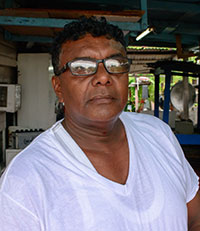After squatting for more than 25 years on Vreed-en-Hoop Foreshore commonly called the jetty, residents are pleading with the authorities to regularize the area – a move which will

pave the way for them to have access to electricity and much needed potable water.
“Thirty-two years ago I came in this area, it was bush all around, no other house just me and God alone,” one of the first occupants of the area said under anonymity as she fears victimisation.
As she sat under one of the many two storey wooden and concrete houses now erected on the foreshore on the West Coast of Demerara, the woman said she was in desperate need of a place to live, and with little choice, had decided to squat on the jetty.
It was not long after that she was accompanied by two or three other families, who took up residence in the area, and as a unified voice, they had made representation to the then Government, the People’s National Congress (PNC) to have the area regularized. Today, the community has approximately 37 houses.

“About 10 years after I come hey to live, the REO give us a letter to get light and telephone. So only about four persons at the time get electricity and telephone,” she recalled.
She said after defeating the PNC in 1992, the People’s Progressive Party/Civic (PPP/C) had promised to regularize the area, however, only a section of the foreshore called “Best” was given residential status.
“The thing is, if they don’t want to regularize the area, at least give us permission to have potable water. Is 32 long years I deh living without water,” the woman said as she complained bitterly about the situation.
According to her, the Guyana Water Incorporated (GWI) had signaled its willingness to

supply the community with potable water but had requested permission from the Best-Klien/Pouderoyen Neighbourhood Democratic Council (NDC) Chairman Omesh Balram.
“GWI is willing to give us water but the NDC Chairman is refusing to give us the letter to take into them. I don’t know why, but he just aint giving it,” she lamented.
Residents in the area depend on rainwater for the purpose of cooking and drinking, however, during the dry season, they are made to pay $1,500 for one drum of water. “All in all, we asking this new government to look into the situation,” she pleaded.
Forty-three-year-old Sunil Dat, who lives just a few houses away from her, said he started living on the foreshore inn 1991 – some 25 years ago. Dat said he is tired of the promises. “Every time a minister visited, was, we will try to do this and we will try to do that and nothing,” he said while noting that the lack of potable water is the biggest problem facing the squatting community.
“When it is not raining, I would load my vehicle up with all the jars and a pump and I would head to somewhere where I could get water,” he shared.
Dat said it is unfortunate that residents are unable to have easy access to potable water in the squatting community when the Guyana Power and Light’s (GPL’s) power station a stone throw away is being supplied with water.
“GWI already have a four inch main in which they are supplying the power station with water. The pipe is just in front of our gates, just about 2ft out 2ft deep and they pass all of these gates and they don’t want to give us water,” he pointed out. Dat is one of the few residents in the area that have access to electricity.
Another resident, 55-years-old Thristram Daharry contended that GWI had conducted an assessment of the area but was awaiting approval from the NDC.
“GWI came and did an assessment. They had planned to use a two inch pipe, but it was just for him (NDC Chairman) to sign,” he further contended. Daharry has been living in the area for more than 22 years. When it is not raining, and he is in need of water, Daharry would use his canter to transport water to his house in black tanks. He has eight tanks in addition to two 450 gallon square tanks.
The NDC Chairman, when contacted, however had a different story. He told Guyana Chronicle that the area is not within the Council’s jurisdiction. “It is not regularized, it is a squatting area,” he said.
Balram said water is vital to life, and the council would never bar residents from having such necessity. Although Vreed-en-Hoop Foreshore is not within the council’s jurisdiction, the NDC Chairman, who has been in office for approximately five years, said “sometime ago” he had made representation to GWI on behalf of the affected residents but the water concerned about the possible wastage of water. “They were going to put a stand pipe, but they were worried about control,” he said.
However, contrary to the Chairman’s and the residents’ take on the situation, GWI Public Relations Officer Leana Bradshaw said the water company has no such documentation within system.
“GWI does not have in its possession any petition or document requesting water service connection from the area in question to say it lacked the signature from the Chairman,” Bradshaw told this newspaper.
“However, GWI is willing and ready to assist the community should residents approach us. Matter of fact, GWI is committed to ensuring equal access to water for all citizens and is in the process of providing new service connections to a number of areas that have never had water access,” she added.
She said just late last year, GWI facilitated new service connections for Andy Ville in Linden and Timehri North.





.jpg)








